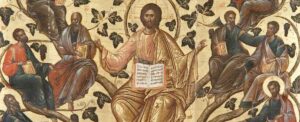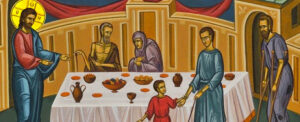Romans 12:6-14 • Matthew 9:1-8
Glory to God the Father, the Son, and the Holy Spirit.
In the past week or so we have celebrated our patron, Saint Olga of Kiev, Equal to the Apostles, and her grandson Vladimir, Equal to the Apostles. This morning we commemorate Saint Mary Magdalene, the original holder of the title Equal to the Apostles.
The Lord sent out twelve men to preach the coming of the Kingdom of God. Later he sent out seventy more. And the Greek word for someone who is sent is apostolos, so we know these men as the Twelve Apostles and the Seventy Apostles. Mary Magdalene was not one of the ones sent out by the Lord on either of those missions, but she was well-known to the Lord and to his apostles. She is mentioned by name in all four gospels, more times than most of the apostles themselves and more than any other woman in the New Testament.
Her description as the Magdalene points to her home town of Magdala, a fishing town on the Sea of Galilee. Both Mark and Luke recount that seven demons had been driven out of her (Luke 8:2). That has led some western writers to speculate about a scandalous past for Saint Mary, trying to connect her with one of the other women we meet in the Gospels – but the Church has no such tradition. Mary Magdalene already has a strong and distinct story among Christ’s disciples.
Scripture says Mary followed the Lord from Galilee (Mark 15:41), provided for his ministry out of her own resources (Mark 16:9; Luke 8:3), and anointed the body of our Lord prior to his crucifixion and burial (John 12:3).
Because she was the first to learn of the resurrection of the Lord (Mark 16:9; John 20:14) and announce the good news to the apostles (John 20:18), she is often called the apostle to the apostles.
After Christ’s resurrection, she traveled widely preaching the Kingdom of God. She participated actively in the founding and growth of the Church from the day of her deliverance by Christ until the end of her life in Ephesus. Though she was not one of the men sent out in groups by Christ in the Gospels, she is a model of apostolic love, sacrifice, courage, and devotion to God, so it’s no surprise that the Church honors her as the Equal to the Apostles.
In that title she joins Saint Thecla, the disciple of Apostle Paul; Saint Photini, the Samaritan woman at the well; Saint Nina, the enlightener of Georgia; and Saint Olga, the root of Christianity in Russia, who are all named Equal-to-the-Apostles. They demonstrate that a person without high social status in her culture or a title in her lifetime can turn the world upside down.
When Mary Magdalene heard Saint Peter say, “Each of you should use whatever gift you have received to serve others, as faithful stewards of God’s grace in its various forms” (1 Peter 4:10), she knew he was talking to her.
* * *
A brother said to Abba Pœmen, “Give me a word,” and he said to him, “As long as the pot is on the fire, no fly nor any other animal can get near it, but as soon as it is cold, these creatures get inside. So it is for the [Christian]. As long as he lives in spiritual activities, the enemy cannot find a means of overthrowing him.” (Sayings of the Desert Fathers, p. 154)
But we live in a culture with a small view of “spiritual activities.” If we don’t have a prayerbook in our hand, or we’re not standing at the divine services in the temple, then we believe the lie that we must be doing something unspiritual. Sure, nuns and priests are spiritual, but we aren’t.
But cleaning up after a messy baby, cooking a meal for which no one will thank you, refereeing arguments among your employees or kids, serving rude customers, sweating over too many bills and not enough money, filling out the same stupid paperwork or picking up the same socks again… these are the ways we serve one another and serve God. They’re opportunities to practice the presence of God. If we can’t sing a doxology while doing tech support or talking to a social worker, we can remember the One Who is with us always, and offer our real-life sacrifice of service and praise to Him. If we can’t prophesy to the nations or feed the world, we can care for the humans He has put in front of us, at home and in the parish.
The cubicle worker and the parent doing laundry in the face of God, with intention, and trusting in divine Grace, is offering a sacrifice of service and love that the Lord receives as sweet incense.
We’ve even invented vocabulary to disrespect most of what we do: Blessing with holy water or receiving the Eucharist are sacred acts – but selling your car or voting for president are secular acts.
That word secular comes from Latin, and it means the world or the age we live in. Yes, we set our hope on the life of the age to come and we live by the laws of the Kingdom of God, but it is here and now that we have to live that life – in the world. We pray daily “Thy kingdom come, thy will be done on earth as it is in heaven.” The secular is precisely the realm we are called to sanctify and make sacred.
There is a temptation to think that the Church is the hierarchy – the bishops and the priests. To live as though only ordained clergy and anointed leaders have spiritual gifts and a calling from God, and the rest of us are just laymen.
I have a confession to make: I really dislike that word, layman. It comes from a Greek word that just means: people. That’s all it means. You and me, babies and bishops and all, we are the people who are the Church.
In scripture some people are ordained to be elders, within the Church, not over it.
He gave gifts to his people… And he himself gave some to be apostles, some prophets, some evangelists, some pastors and teachers, to equip the saints for the work of ministry, so that the body of Christ may be built up. (Ephesians 4:8,11).
I’ve been taught that one of the primary functions of the priest in the community is to help individuals figure out what spiritual gifts or enthusiasms or ideas they have, then bless them and get out of their way.
In the prophecy of Habakkuk at one point the prophet sits down to hear what the Lord will say to him. “The Lord answered me, and said, ‘Write the vision, and make it plain in writing, that he may run that readeth it’” (Habakkuk 2:2,3). Don’t leave that vision as a fantasy if you can write it down and make it into a plan.
Pastors are in the business of blessing people with ideas to achieve good things.
Some years ago in our parish in Washington, we realized a couple of families in our parish were having trouble putting food on the table. Someone asked the rector if there’s a way we could have a food pantry at the church – shelves of non-perishable foods, ready to pick up, no questions asked. Our priest said, “Absolutely!” and blessed them to make it happen: Turn that vision into goals, ask wise advisors, figure out the budget and let’s find donors. And that ministry continued for a number of years, as long as it was needed.
Our local schools began to get weird, and a few parents raised the question of whether it would be possible to think about launching a church school. The priest and parish council enthusiastically blessed the idea, and encouraged parents to write up a plan, make a budget, raise funds, and make their vision a reality. Today Saint Basil Academy is twenty years old. The kids we first set out to teach are now in college or trades or ministry, and the school’s founders have become experienced educators and spiritual mothers and fathers.
St. Paul gives us some examples of spiritual gifts in this morning’s Epistle reading – serving, teaching, encouraging, ruling, leadership, charity. And in other places he lists additional gifts like mercy, wisdom, knowledge, faith, healing, working miracles. The gifts of God are present here in the parish community for the work of ministry, for the building up of the Church, and for revealing the life of the Kingdom of God to the nations, starting in Sioux Falls.
The gifts given to each of us at baptism aren’t just effective ways to preach the Gospel and make converts. Our culture has taught us such a narrow idea of what it means to serve God. We need to forget the idea of “ministry” as something pastors do, or something persuaders do on the internet — and go back to the apostolic model of servants who lead in families, in professions, in building up neighborhoods, and in serving brothers and sisters in the parish.
Spiritual gifts and talents are the concrete action of God’s grace, of his divine life in our lives. This means that our gifts are how we are connected to God and to each other.
When we are ignorant of our gifts or neglect them, we end up becoming consumers, not servants or leaders – and that’s when conflict and discord arise. This is true in the family, in the world, and in the Church.
There are two parts to today’s Epistle reading: In the first part Saint Paul encourages us to use the gifts that God has given us (verses 6-8), and in the second part (verses 9-14) he gives us an image of what the Christian life should look like.
That image of what our community should be is nothing surprising; it’s the same thing we hear throughout the Gospels. “Let love be without hypocrisy. Hate what is evil; cling to what is good. Be devoted to one another in love. Honor one another above yourselves… not slothful… serving the Lord… rejoicing in hope, patient in tribulation, continuing steadfast in prayer.”
The words are familiar to us, but you know how hard it can be to do the things that we confess to be true. Don’t settle for joining the right religion, defending the true Faith. Christ our God is calling us to live in union with him, to be conformed to his likeness, just as the Son of Man did not come to be served, but to serve (Matthew 20:28).
This is the point of our life here on earth: the struggle and step by step walk away from satisfying our passions – through purification and illumination, to the likeness of Christ, a long obedience in the same direction. All of the virtues Paul calls us to live, in today’s Epistle reading, are virtues that flow from the life of Christ: love, prayer, mercy, diligence, hospitality, blessing. As we embody these virtues in action, we line up our lives with the life of Christ – we cooperate with grace, the energies and personal action of God that transforms us to become like him in action, in reality, in spirit and truth.
So as we prepare today to receive the life-giving mysteries of Christ, let’s continue the struggle to keep the grace that our Lord gives us – don’t casually spill it – and struggle to align our lives ever more with the resurrection life and deifying action of Christ, for our salvation, and for the life of the world.
And when the Lord gives you a spark, an idea of something the Church could be doing, be ready. “Write the vision, and make it plain in writing, so that he who reads it can run with it.”
A parish where five hundred people are served by one priest is a failure. A healthy parish is one where we all serve, honor, freely give, bless, care for one another, and “consider how to encourage one another to love and good works” (Hebrews 10:24). The King James reads, “provoke one another to love and good works!”
“For we are God’s workmanship, created in Christ Jesus to do good works, which God has prepared in advance for us to do.” (Ephesians 2:10).
To the glory of God the Father, the Son, and the Holy Spirit.





